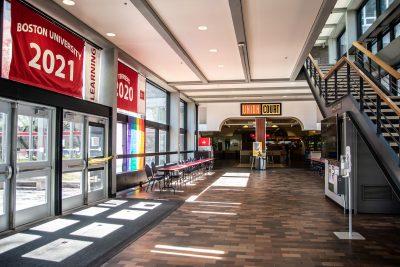
In light of the coronavirus pandemic, Boston University’s dining operations have undergone a number of changes. There has been a complete shut-down of self-service stations, an increase in take-away options, a shift to disposable dishes, cups and utensils along with more frequent cleaning and sanitation.
The Fresh Food Co. at Warren Towers, West Campus and Marciano Commons will remain open along with campus Starbucks locations, City Convenience stores and select options in the George Sherman Union, according to the BU Dining website.
In a joint letter sent to the community, President Robert Brown and Jean Morrison, university provost and chief academic officer, wrote that the decision to keep dining options open on-campus has been made keeping in mind the fact that many students are not able to return home at the moment.
Per the statewide restrictions placed by Gov. Charlie Baker March 15, the dining halls not allow students and other guests to dine-in and will offer take-away options. The dining halls will only host up to 25 guests at a time, according to the BU Dining website.
Colin Riley, a BU spokesperson, said the university is working hard to keep public spaces sanitary, but that students must also contribute to the effort in keeping everyone healthy.
“The surfaces and the entry points that people are touching are being cleaned frequently,” Riley said. “More importantly, we want to make sure that students are taking those same precautions and practicing frequent hand washing and social distancing.”
Dining hall workers have been informed by their supervisors of the protocol to be followed in case they start displaying any symptoms of COVID-19, Riley said. He added that dining staff members are also being cross-trained to cover a variety of different responsibilities if it becomes necessary to do so in the case of a staff shortage.
“The supervisors are dealing with that issue when communicating with all of our employees — what our expectations are, and how they need to communicate with us if there are any issues and concerns,” Riley said. “It’s the priority right now.”
Students who hold jobs with BU Dining and are currently on-campus can continue to work in the dining halls. Additionally, efforts are being made to ensure compensation for student dining workers part of the work-study program who are unable to return to campus.
“Financial Assistance is working on those issues right now, and that will be a conversation for which they will need guidance from the federal government because the federal government funds half of the work-study [programs],” Riley said.
BU does not anticipate a food shortage in case of a nationwide or statewide lockdown, Riley said.
“We have checked all of our supply chains and had communication with all of our suppliers and we believe we are in a good situation,” Riley said.
According to BU’s coronavirus information website, a disruption in supply chains from national contractors would lead to a shift to local suppliers, and will not affect the availability of nutritious meals for students.
Riley said that while he recognizes many students don’t feel they are at risk, it is important for them to acknowledge these changes as indicative of a severe situation and take precautions to protect others.
“The key point is to take every precaution to protect yourself because everything that you do also protects others,” Riley said.





























































































































